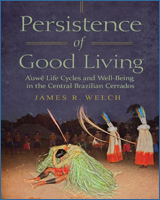Native terms in the A’uwẽ (or Xavante) language conform to the orthography currently in use by A’uwẽ teachers at the Pimentel Barbosa Municipal School and the Etênhiritipá State Fundamental Education School, although any errors are my own. It is an orthography in transition, originally developed by missionary linguists (Hall, McLeod, and Mitchell 1987; Lachnitt 2003) based on dialects spoken in their immediate vicinities and later modified through its application and transmission by A’uwẽ teachers at Pimentel Barbosa and Etênhiritipá communities. The system as it is currently applied differs from versions in use in other A’uwẽ communities (most expressively by the elimination of the letters t and d from the phonemes ts and dz, respectively) and even from previous representations in publications coordinated by members of Pimentel Barbosa and Etênhiritipá communities.
I used past tenses to recall events, circumstances, and ongoing states from 2004 to 2022, the years in which I conducted fieldwork contributing to the contents of this ethnography. In doing so, I sought to communicate the vigor, resilience, and persistence of a living population that is proud of its cultural distinctiveness through this moment, as I finish writing. I expect it will continue to be just as alive and dignified into the future, although diverse historical transformations associated with internal colonialism and insertion in external sociocultural spheres will cause some of the details contained herein to change. This grammatical approach is intended to recognize that my observations and experiences do not equip me to characterize affairs in the future, whenever this book might be read. Past tenses cause some awkward constructions, especially when referring to ongoing traditions. As author, I was sometimes tempted to switch to present tenses to communicate ongoing continuity but refrained from doing so for the sake of consistency. Also, I chose to value the enduring quality of writing that, with time, could erroneously suggest the immutability of culture were present tenses used. Thus, the past tenses used in this book do not, in any way, suggest A’uwẽ people or culture have ended. Rather, they indicate that the material drawn on to prepare this text is bounded.

